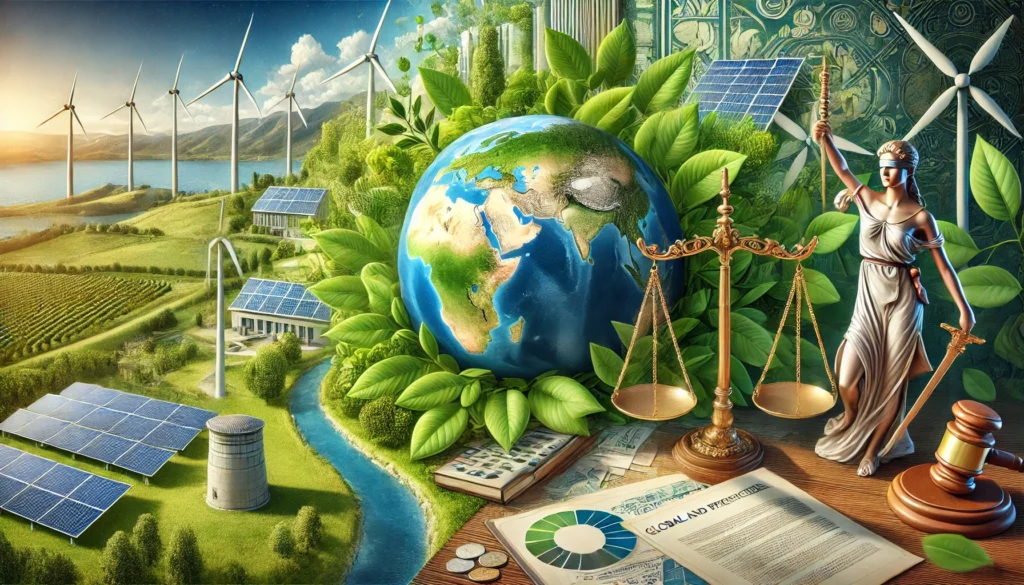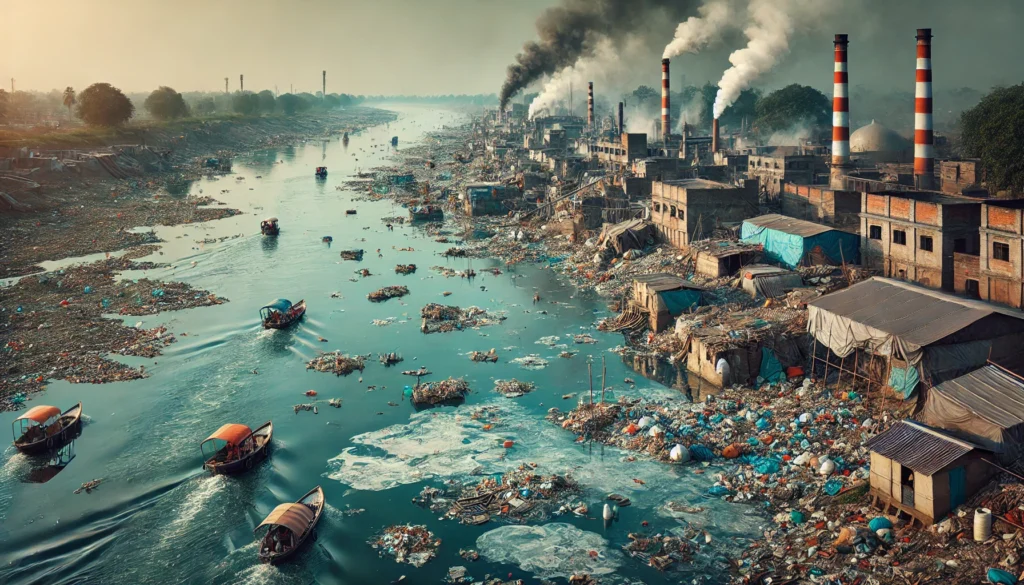Published on 19th June 2025
Authored By: Jahnavi Raghu
PES University
Introduction
The proliferation of plastic waste represents one of the most pressing environmental challenges of the 21st century. With global plastic production exceeding 367 million metric tons annually and only 9% being effectively recycled, the remaining plastic waste has created an environmental crisis of unprecedented proportions. This article examines the legal frameworks governing plastic waste management at international, national, and local levels, analysing their effectiveness, implementation challenges, and potential future developments. As plastic pollution continues to threaten marine ecosystems, wildlife, human health, and climate stability, the legal mechanisms designed to address this crisis require critical examination and potential reform.
International Framework for Plastic Waste Management
- The Basel Convention and Plastic Waste Amendments
The Basel Convention on the Control of Transboundary Movements of Hazardous Wastes and Their Disposal represents the principal international treaty governing waste management. Originally adopted in 1989 and entering into force in 1992, the Convention established a framework to regulate the movement of hazardous waste between nations, particularly addressing the flow of waste from developed to developing countries.[1] The 2019 Plastic Waste Amendments to the Basel Convention marked a watershed moment in international plastic waste regulation.
These amendments, effective January 2021, significantly expanded the Convention’s scope by including plastic waste within its “prior informed consent” procedure.[2] Under this framework, exporting countries must obtain permission from receiving nations before shipping most contaminated, mixed, or unrecyclable plastic waste.[3] This represents the first globally binding framework specifically addressing plastic waste trade.
The legal implications of these amendments are substantial. Countries party to the Convention are now legally obligated to obtain consent before exporting certain plastic waste materials, enhancing transparency and accountability in the international plastic waste trade. However, enforcement mechanisms remain challenging, as the Convention relies primarily on national implementation and lacks robust international compliance measures.
- United Nations Environment Assembly (UNEA) Resolutions
The United Nations Environment Assembly has adopted several resolutions addressing marine plastic pollution. UNEA Resolution 5/14, adopted in March 2022, established an Intergovernmental Negotiating Committee tasked with developing a legally binding international instrument on plastic pollution by 2025.[4] This resolution represents a significant legal development, potentially leading to a comprehensive treaty addressing the full lifecycle of plastics.
The proposed treaty aims to cover production, design, and disposal of plastic products, potentially establishing legally binding commitments for signatory nations.[5] While negotiations remain ongoing, the resolution signifies international recognition that plastic pollution requires coordinated global governance and legally enforceable standards.
- The Stockholm Convention on Persistent Organic Pollutants
The Stockholm Convention, which entered into force in 2004, addresses chemicals used in plastic production that pose significant risks to human health and the environment. The Convention legally requires parties to eliminate or restrict the production and use of specific persistent organic pollutants (POPs), including several additives commonly used in plastics.[6]
The Convention’s regulatory approach focuses on chemicals rather than plastic itself, yet its provisions indirectly impact plastic waste management by restricting hazardous substances in the waste stream. From a legal perspective, the Convention exemplifies how international environmental law can address specific components of plastic pollution through targeted chemical regulation.
- Regional Marine Agreements and Protocols
Several regional marine agreements contain legally binding provisions addressing plastic pollution, including the Barcelona Convention (Mediterranean), the Cartagena Convention (Caribbean), and the OSPAR Convention (North-East Atlantic). These agreements establish regionally tailored legal frameworks requiring member states to implement measures preventing marine plastic pollution.
The legal significance of these regional approaches lies in their ability to create binding obligations adapted to specific geographic contexts. They often include more stringent provisions than global frameworks, serving as laboratories for progressive legal approaches to plastic waste management.
National Legislative Approaches to Plastic Waste Management
- Extended Producer Responsibility (EPR) Systems
Extended Producer Responsibility represents a legislative approach that shifts responsibility for post-consumer plastic waste from consumers and municipalities to producers.[7] The legal implementation of EPR varies significantly across jurisdictions, from voluntary industry-led initiatives to comprehensive mandatory schemes.
The European Union’s Directive 2008/98/EC on waste established EPR as a core principle, requiring member states to implement programs making producers responsible for the entire lifecycle of their products. Germany’s Packaging Ordinance (Verpackungsverordnung) pioneered this approach in 1991, creating a legally binding framework requiring producers to finance the collection, sorting, and recycling of packaging waste.
From a legal perspective, EPR systems represent a market-based regulatory approach combining command-and-control elements with economic incentives. Their effectiveness depends significantly on specific legal design elements, including fee structures, transparency requirements, and enforcement mechanisms. Data suggests that well-designed EPR systems can dramatically increase plastic recycling rates and incentivize eco-design, though implementation challenges persist.
- Single-Use Plastic Bans and Restrictions
Numerous jurisdictions have enacted legislation prohibiting or restricting specific single-use plastic items. The European Union’s Single-Use Plastics Directive 2019/904 represents perhaps the most comprehensive approach, implementing a range of legal measures from outright bans on certain products to consumption reduction targets, EPR schemes, and labeling requirements.
Implementation of these bans raises several legal considerations, including proportionality, necessity tests, and compliance with international trade rules. The World Trade Organization’s Technical Barriers to Trade Agreement requires that such restrictions not create unnecessary obstacles to international trade, necessitating carefully crafted legislation with appropriate environmental justifications.
Legal challenges to plastic bans have emerged in various jurisdictions, often based on constitutional grounds or trade agreement provisions. The Supreme Court of the United States has generally upheld local plastic bag bans when challenged, finding they fall within municipal police powers to regulate for public health and environmental protection. However, several U.S. states have enacted pre-emption laws prohibiting local plastic ordinances, creating a complex legal landscape.[8]
- Deposit-Return Schemes
Deposit-return schemes (DRS) represent a legislative approach requiring consumers to pay a deposit when purchasing plastic beverage containers, refunded upon return of the empty container. Norway’s system, established through the Regulations Relating to Return Systems for Beverage Packaging, achieves a 97% return rate for plastic bottles, demonstrating the potential effectiveness of well-designed legal frameworks.
The legal structure of DRS varies significantly across jurisdictions. Germany’s Mandatory Deposit Regulation (Pfandverordnung) established a nationwide system through federal legislation, while some U.S. states implement DRS through separate state laws. The legal framework typically addresses deposit amounts, handling fees, redemption infrastructure requirements, and reporting obligations.
From a jurisprudential perspective, DRS represents a hybrid legal approach combining elements of command-and-control regulation with market-based incentives. Courts have generally upheld these schemes when challenged, finding they serve legitimate environmental purposes and impose reasonable burdens on affected parties.
- Landfill and Incineration Regulations
Legal frameworks governing waste disposal facilities critically impact plastic waste management. The European Union’s Landfill Directive 1999/31/EC established a legal hierarchy prioritizing recycling over landfilling, with progressive targets reducing landfilled waste. Similarly, the EU Industrial Emissions Directive 2010/75/EU governs waste incineration facilities, establishing legally binding emission limits and operational requirements.
The legal approach to landfill and incineration regulation typically combines permitting requirements, technical standards, monitoring obligations, and financial mechanisms like landfill taxes. Sweden’s Ordinance on Landfill of Waste (SFS 2001:512) implements a comprehensive legal framework including strict criteria for waste acceptance, operational standards, and closure requirements.[9]
Waste facility regulations raise complex jurisdictional issues, with responsibility often divided between national, regional, and local authorities. This fragmentation can create enforcement challenges and regulatory inconsistencies. From an environmental justice perspective, facility siting decisions raise significant legal concerns regarding equitable distribution of environmental burdens.
Emerging Legal Trends in Plastic Waste Management
- Circular Economy Legislation
Circular economy legislation represents an emerging legal approach addressing the full lifecycle of plastic products. The European Union’s Circular Economy Action Plan established a comprehensive legal framework promoting sustainable product design, waste prevention, and recycling.[10] The EU’s proposed Ecodesign for Sustainable Products Regulation would establish legally binding requirements for product durability, reusability, and recyclability, including specific provisions for plastic products.[11]
China’s Circular Economy Promotion Law similarly establishes a legal framework encouraging resource conservation and environmental protection throughout the production chain. This legislation employs various legal mechanisms, including product standards, extended producer responsibility, and fiscal incentives to promote circularity.
From a legal theory perspective, circular economy legislation represents a paradigm shift from end-of-pipe regulation to integrated lifecycle management. This approach raises complex jurisdictional questions, as effective implementation requires coordination across traditionally separate legal domains including chemical regulation, product standards, waste management, and trade policy.[12]
- Plastic Taxes and Economic Instruments
Economic instruments, including plastic taxes, represent an increasingly common legal approach to plastic waste management. The United Kingdom’s Plastic Packaging Tax, which entered into force in April 2022, imposes a charge on plastic packaging containing less than 30% recycled content. Similarly, Italy’s Plastic Tax establishes a levy on single-use plastic items.
These economic instruments raise interesting legal questions regarding their classification as regulatory charges versus revenue-raising taxes, with corresponding implications for legislative authority and implementation. Courts have generally upheld such measures when challenged, typically finding they serve legitimate environmental purposes rather than purely fiscal objectives.
The effectiveness of these legal instruments depends significantly on specific design elements, including tax rates, scope of application, revenue allocation, and enforcement mechanisms. A comparative legal analysis suggests that plastic taxes work best when integrated within broader legislative frameworks including complementary measures like product standards and EPR systems.
- Right to Repair and Durability Requirements
Emerging legislation addressing product durability and repairability indirectly impacts plastic waste generation. The European Union’s “Right to Repair” initiatives, including obligations under the Ecodesign Directive 2009/125/EC, establish legally binding requirements for product design facilitating repair and component replacement.
These legal frameworks address planned obsolescence and disposable design practices that contribute significantly to plastic waste. From a legal perspective, these requirements represent a novel regulatory approach focusing on upstream interventions rather than downstream waste management.
- Chemical Regulation and Plastics
Chemical legislation increasingly addresses additives and substances used in plastic production. The European Union’s REACH Regulation (EC 1907/2006) creates a comprehensive legal framework for chemical registration, evaluation, and restriction, significantly impacting plastic formulations. The regulation’s authorization process for substances of very high concern has restricted several plastic additives, indirectly influencing waste management.
The legal interface between chemical and waste legislation creates complex regulatory challenges. When plastic waste contains restricted substances, its management is governed by overlapping legal regimes with potentially contradictory requirements. This regulatory complexity highlights the need for integrated legal approaches addressing the chemical-product-waste continuum.
Implementation and Enforcement Challenges
- Jurisdictional Complexity
Plastic waste management legislation spans multiple jurisdictional levels, creating complex governance challenges. Authority is typically divided between international bodies, national governments, regional authorities, and municipalities, with overlapping and sometimes contradictory mandates. This fragmentation can create regulatory gaps and inconsistencies.[13]
In federal systems, jurisdictional tensions frequently arise between national and subnational authorities. In the United States, legal conflicts between state plastic regulations and local ordinances have spawned litigation regarding pre-emption doctrine and home rule authority. Courts have reached varying conclusions depending on specific constitutional provisions and statutory language.
- Monitoring and Compliance Mechanisms
Effective legal frameworks require robust monitoring and compliance mechanisms. Traditional enforcement approaches relying on inspections and penalties face significant challenges when applied to diffuse plastic pollution sources. Emerging legal approaches increasingly incorporate extended monitoring requirements, third-party certification, and technological solutions like digital tracking systems.
The European Union’s Waste Framework Directive 2008/98/EC establishes comprehensive reporting obligations, requiring member states to maintain waste data registers and submit implementation reports.[14] However, data quality and comparability issues persist, highlighting the need for standardized methodologies and enhanced verification procedures.
- Illegal Waste Trade and Dumping
Despite regulatory frameworks, illegal waste trade and dumping remain significant challenges undermining legal plastic waste management systems. The transboundary nature of these activities creates complex jurisdictional issues requiring international cooperation. Interpol’s Operation 30 Days at Sea identified numerous cases of illegal plastic waste trafficking, highlighting enforcement gaps.
Legal responses include enhanced penalties, extended liability provisions, and improved international cooperation mechanisms. The EU’s Waste Shipment Regulation (EC) No 1013/2006, as amended, strengthened enforcement provisions by establishing a framework for inspections and controls. However, implementation remains challenging due to limited resources and detection difficulties.
Future Legal Developments and Reform Proposals
- Towards a Global Plastic Treaty
The ongoing negotiations toward a legally binding global plastic pollution treaty represent a potentially transformative development in plastic waste governance.[15] The treaty’s effectiveness will depend significantly on its specific legal elements, including:
- Scope of coverage across the plastic lifecycle
- Nature of obligations (binding vs. voluntary)
- Implementation mechanisms and financial support
- Compliance procedures and dispute resolution
- Relationship with existing legal frameworks
From a legal design perspective, the treaty negotiations must address complex questions regarding national sovereignty, common but differentiated responsibilities, and interface with trade law. The resulting legal framework will likely establish a new governance paradigm for plastic waste management with profound implications for national legislation.
- Harmonization of Standards and Definitions
Legal fragmentation regarding plastic waste definitions, recycling standards, and labeling requirements creates significant implementation challenges. Future legal developments will likely focus on harmonizing these elements to enhance regulatory coherence and facilitate compliance.
The International Organization for Standardization’s work on plastics standards, particularly ISO 15270 on plastic waste management, represents an important step toward technical harmonization. However, transforming these voluntary standards into legally binding requirements requires legislative action at national and international levels.
- Technology-Based Regulatory Approaches
Emerging technologies create opportunities for innovative legal approaches to plastic waste management. Blockchain systems for waste tracking, artificial intelligence for sorting systems, and advanced recycling technologies all require appropriate regulatory frameworks balancing innovation facilitation with environmental safeguards.
The European Union’s proposed Digital Product Passport regulation, which would require products to carry detailed information about their composition and recyclability, exemplifies how digital technologies may transform plastic waste regulation. This approach raises important legal questions regarding data ownership, privacy, and regulatory oversight.
Conclusion
The legal landscape governing plastic waste management is evolving rapidly in response to growing environmental concerns. While significant progress has been made in developing legal frameworks at international, national, and local levels, substantial gaps and implementation challenges remain. The effectiveness of these legal systems ultimately depends on their design, coherence, and enforcement capacity.
Future legal developments will likely focus on creating more integrated approaches addressing the full lifecycle of plastics, enhancing international cooperation, harmonizing standards, and leveraging technological innovations. As plastic pollution continues to threaten environmental and human health, robust legal frameworks will play an increasingly critical role in managing this global challenge. The ongoing negotiations toward a binding global plastic treaty represent a pivotal opportunity to establish a comprehensive legal foundation for sustainable plastic waste management that transcends jurisdictional boundaries and addresses the full complexity of this pressing environmental issue.
References
[1] Kummer, K., 1999. International management of hazardous wastes: the Basel Convention and related legal rules. Oxford University Press, USA.
[2] Moen, A.E., 2008. Breaking Basel: The elements of the Basel Convention and its application to toxic ships. Marine Policy, 32(6), pp.1053-1062.
[3] Ibid.
[4] Islam, M.S., Lee, Z., Shaleh, A. and Soo, H.S., 2024. The United Nations Environment Assembly resolution to end plastic pollution: Challenges to effective policy interventions. Environment, Development and Sustainability, 26(5), pp.10927-10944.
[5] Perrez, F.X., 2020. The role of the United Nations Environment Assembly in emerging issues of international environmental law. Sustainability, 12(14), p.5680.
[6] Lallas, P.L., 2001. The Stockholm Convention on persistent organic pollutants. American Journal of International Law, 95(3), pp.692-708.
[7] Siddiqui, J. and Pandey, G., 2013. A review of plastic waste management strategies. Int. Res. J. Environ. Sci, 2(12), pp.84-88.
[8] Pandey, P., Dhiman, M., Kansal, A. and Subudhi, S.P., 2023. Plastic waste management for sustainable environment: techniques and approaches. Waste Disposal & Sustainable Energy, 5(2), pp.205-222.
[9] Huang, S., Wang, H., Ahmad, W., Ahmad, A., Ivanovich Vatin, N., Mohamed, A.M., Deifalla, A.F. and Mehmood, I., 2022. Plastic waste management strategies and their environmental aspects: A scientometric analysis and comprehensive review. International Journal of Environmental Research and Public Health, 19(8), p.4556.
[10] Idumah, C.I. and Nwuzor, I.C., 2019. Novel trends in plastic waste management. SN Applied Sciences, 1, pp.1-14.
[11] Lazarevic, D., Aoustin, E., Buclet, N. and Brandt, N., 2010. Plastic waste management in the context of a European recycling society: Comparing results and uncertainties in a life cycle perspective. Resources, Conservation and Recycling, 55(2), pp.246-259.
[12] Babaremu, K.O., Okoya, S.A., Hughes, E., Tijani, B., Teidi, D., Akpan, A., Igwe, J., Karera, S., Oyinlola, M. and Akinlabi, E.T., 2022. Sustainable plastic waste management in a circular economy. Heliyon, 8(7).
[13] Horodytska, O., Cabanes, A. and Fullana, A., 2019. Plastic waste management: current status and weaknesses. In Plastics in the Aquatic Environment-Part I: Current Status and Challenges (pp. 289-306). Cham: Springer International Publishing.
[14] Supra 5
[15] Shin, S.K., Um, N., Kim, Y.J., Cho, N.H. and Jeon, T.W., 2020. New policy framework with plastic waste control plan for effective plastic waste management. Sustainability, 12(15), p.6049.




